by Claire Davis | Oct 18, 2023
 Finally, Fall is in the air! It seems like it takes forever for summer to leave Florida. What better way to kick off the Fall season than by bobbing for or picking a deep red, bright green, or yellow apple? Currently, there are over 2,500 varieties of apples grown in the United States, and 7,500 varieties grown throughout the world. Did you know that apples are also grown in all 50 states? That is a lot of apples to celebrate throughout the month of October and on National Apple Day, October 21!
Finally, Fall is in the air! It seems like it takes forever for summer to leave Florida. What better way to kick off the Fall season than by bobbing for or picking a deep red, bright green, or yellow apple? Currently, there are over 2,500 varieties of apples grown in the United States, and 7,500 varieties grown throughout the world. Did you know that apples are also grown in all 50 states? That is a lot of apples to celebrate throughout the month of October and on National Apple Day, October 21!
Have you ever heard the saying, “An apple a day keeps the doctor away”? This was something that I was told throughout my childhood. I did not believe that an apple a day would keep me healthy and away from the doctor’s office. Now I understand that the saying is a tribute to the apples nutritional value and its health benefits. Per the USDA, an apple is an excellent source, for your daily nutrition, of fiber and vitamin C!
Apples are a great fruit to add to our diet! With the hundreds of varieties available, there is an apple to suit almost anyone’s taste. Apples can be sweet, tart, crisp, crunchy, soft, or mushy, however you like them. To determine what apples you like best, try hosting an apple tasting. Purchase different types of apples, cut them up into slices or silly shapes, and serve them fresh. If you are feeling adventurous, try smothering your apple slice in peanut butter, hazelnut spread, or in a yogurt dip. The flavor combinations are endless.
Maybe you or your children do not care for the taste of apples. That’s ok! There are several activities you can still participate in to celebrate National Apple Month and Day. I have compiled a short list of activities to give a try.
-
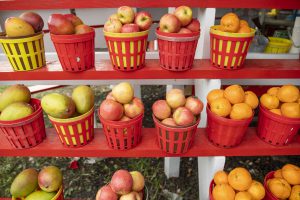
Roadside market produce. Photo taken 12-12-22.
Apple bowling. All you will need for this activity is 6 bottles, an apple, a starting line, and a way to keep score.
- Apple towers. See how many apples you can balance on top of one another. The tower with the most apples wins!
- Apple Puzzle. This will take a parent with “expert” knife cutting skills to cut the apple into several pieces. Take them apart and try to put it back together.
- Apple Painting. Cut your apple in half or different shapes, dip into your paint, and you’ll have a masterpiece on your hands in no time.
- Apple Rotting. For this experiment, you will need an apple, four drinking glasses, water, oil, and vinegar. Quarter your apple and place into the cups. Fill three of the cups with water, oil, or vinegar separately. The remaining glass will have just air. Make a hypothesis on which apple slice will decompose the quickest and which will last the longest.
https://fdc.nal.usda.gov/fdc-app.html#/food-details/171688/nutrients
https://medlineplus.gov/ency/article/002404.html
https://health.cornell.edu/sites/health/files/pdf-library/fiber-digestion-health.pdf
40 Easy Apple Activities for Kids to Experiment, Create & Learn
by Claire Davis | Sep 28, 2023
Now that school is back in full swing for our kids, it can be hard to make sure they are eating nutritious foods at each meal. I know that I fall short when I make meal and snack choices, imagine how difficult it is for a kid. Follow along below to learn more about why it is important to make healthy choices, as well as how to teach youth to make healthy breakfasts and afterschool snack choices!

Strawberries, blueberries, cereal grains, and a banana. Fragaria, fruits, foods, red, sweets, healthy eating. UF/IFAS Photo: Tyler Jones.
Why should I make healthy choices?
That is a great question! As a busy mom of two, I am always trying to balance work, school, family, and our social calendar. Healthy eating is essential for everyone. Your eating habits can contribute to physical movement, sleep, health, energy levels, and education. I can tell a large, postivie difference in my overall attitude, energy levels, and sleep when I am making better choices. Have you ever heard the saying, “Breakfast is the most important meal of the day”? After a long night’s sleep, we have to break our fast from food, which in turn boosts our energy levels. For our children, it has been determined by the CDC that “Healthy students are better learners. Research shows that eating habits and healthy behaviors are connected to academic achievement. Student participation in the School Breakfast Program is associated with better grades and standardized test scores, reduced absences, and improved memory” (3). By starting off the day with a good breakfast, youth perform better in school. If a healthy breakfast can make a big difference, then healthy food options at other meals or snacks should make a huge impact.
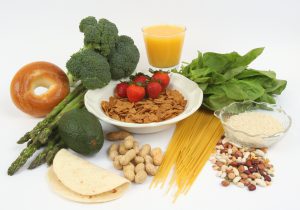
Keywords: folic acid rich foods, food, healthy, metabolism. (UF/IFAS photo by: Josh Wickham)
When you say healthy choices, what does that mean?
This does not mean that you must diet every single day. This does not mean that you cannot have the cookies or ice cream. Busy people don’t have a lot of time to prepare and eat healthy meals. It can be helpful to have a quick list of ideas to maintain healthy eating. It is important for you to balance your meals. Consider choosing at least eating 3 of the following serving sizes every day: dairy, fruit, grains, healthy fats, proteins, or vegetables. It is also important to cut down on foods that are high in fat or added sugar. Foods in moderation are okay, but try to not overindulge on the pizza, sodas, or desserts. On top of eating from different food groups, cutting down on fats or sugars, remember to drink lots of water.

Case of bottled water. Photo taken 08-06-20.
Your body is unable to continue functioning properly without fluids. Staying hydrated may seem like a difficult task, but it is extremely important for us to stay hydrated for optimal health and performance throughout the day. “Drinking enough water each day is crucial for many reasons: to regulate body temperature, keep joints lubricated, prevent infections, deliver nutrients to cells, and keep organs functioning properly. Being well hydrated also improves sleep quality, cognition, and mood.” (1) staying hydrated, we can seriously harm ourselves. Whether you are considered youth or an adult, you can still lose approximately 40 percent (2) of your body’s water during hard work or exercise.
How do I help my youth make better food choices?

4H youth participating in a cooking workshop at 4H University. Photo taken 07-26-22.
The earlier that we introduce wholesome, nutritious choices into our youth’s diet, the easier it is for them to make healthy choices. Many of our habits start in the home and you are the prime role model. I have found that if I show that I am willing to try a food, my child will also be willing to try it. Whereas, if I turn my nose up at a food, my child tends to think that they will also not enjoy that food.
Kids who enjoy breakfast every day have better memories, more stable moods, higher energy, and score higher on tests. Breakfast does not have to be a difficult meal to make healthy. Eating a breakfast high in quality protein—from enriched cereal, yogurt, milk, cheese, eggs, meat, or fish— is a great place to start.
Some high protein breakfast ideas:
- Boil eggs at the beginning of the week and offer them with a low-sugar, high-protein cereal, and an apple to go.
- Make breakfast burritos filled with scrambled eggs, cheese, chicken, or beef on a Sunday and freeze them.
- An egg sandwich, a cup of Greek yogurt or cottage cheese with fruit, and peanut butter on wholegrain toast can all be eaten on the way to school.
If I keep junk food in the house, I tend to eat it. I always make a point to keep healthy snack options in the house available, rather than boxes of junk food. Healthy snack options at home include fruits, vegetables, and healthier beverages. Soda is high in sugar, so to help cut the sugar, I keep water, milk, and pure fruit juice in the fridge. It is easy for me to make those choices since I am the adult that goes grocery shopping. Try including your child when making snacks to let them make good choices too!
Ideas for healthier alternatives:
- Instead of French fries, try baked fries from the oven and lightly salted.
- Instead of ice cream, try Greek yogurt, sorbet, or a fruit smoothie.
- Instead of fried chicken, try baked or grilled chicken.
- Instead of doughnuts or pastries, try bagels or English muffins.
- Instead of homemade cookies, try graham crackers, vanilla wafers, or fruit and fruit dip.
- Instead of potato chips, try baked vegetables chips or nuts.
- Craving something crunchy? Try carrots or celery.
- Craving something sweet? Try vanilla Greek yogurt with some fresh fruit.
- Craving something salty? Try popcorn or edamame.
Sources:
- https://www.hsph.harvard.edu/news/hsph-in-the-news/the-importance-of-hydration/
- https://www.scripps.org/news_items/6630-6-simple-ways-to-stay-hydrated
- https://www.cdc.gov/healthyschools/features/eating_healthier.htm#:~:text=Healthy%20students%20are%20better%20learners,reduced%20absences%2C%20and%20improved%20memory.
- https://www.helpguide.org/articles/healthy-eating/healthy-food-for-kids.htm
- https://www.purdueglobal.edu/blog/student-life/healthy-food-options-college-students/
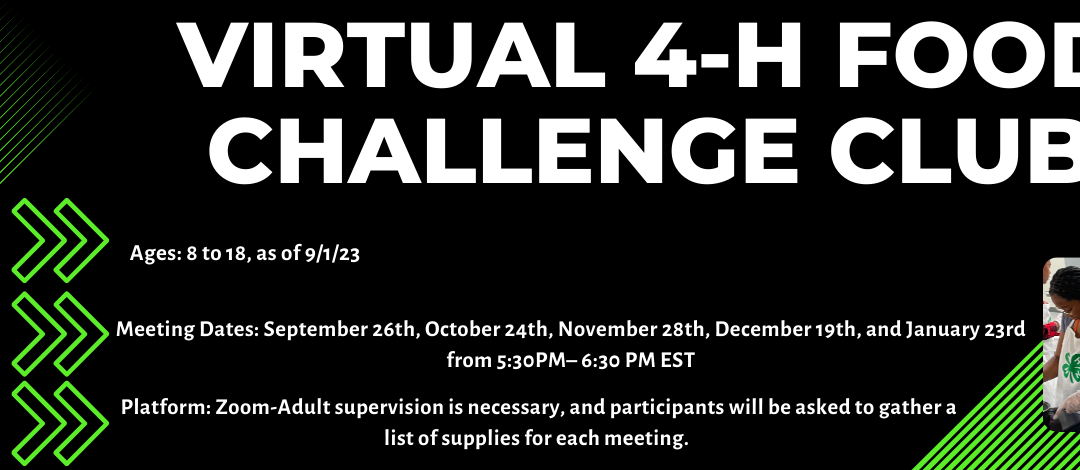
by pmdavis | Sep 14, 2023

First meeting is Sept 26th at 5:30 EST
I am so thrilled to let you know about a new endeavor with Florida 4-H. We are trying a virtual Food Challenge cooking club this year. This is so exciting for me because some of my fondest memories are cooking with my grandmother and Mom. I got to learn how to prepare foods and be creative as I was growing up pulling on their apron strings. I also enjoyed teaching and sharing these skills with my own children. What makes this even better is now I get to share and learn with all of you who join our program.
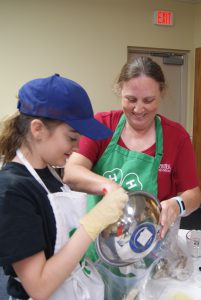
Paula and Madelyn Cooking together
By joining the new Virtual 4-H Food Challenge Club, you will embark on a fun, yet challenging, food-focused adventure right from the comfort of your kitchen! The club adventure will provide a fun atmosphere for you and your children to have a family time experience building lasting memories together. With the help from Florida 4-H Youth Development Faculty, you will get to unleash your culinary creativity and try delicious recipes while learning kitchen skills from safety, nutrition, and other food related life skills. Families will learn about competitive events related to foods like the Florida Food Challenge Competition. Families will also have the opportunity to make friends with fellow 4-H members across the state.
The virtual club is open to youth members ages 8-18 and will meet once a month starting in September. The club will meet via ZOOM on the following Tuesdays: September 26th, October 24th, November 28th, December 19th, and January 23rd from 5:30 – 6:30 PM ET. We request that adult supervision is present with the youth during the meeting and home practice sessions. The participants will be asked to gather a list of supplies for each monthly meeting as we focus on a new skill for each meeting.
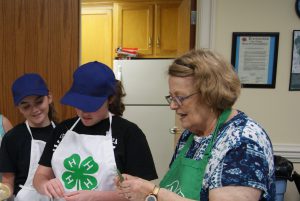
Paula’s family working with herbs to prepare a dish.
During this course we will help families enjoy preparing food, provide you with opportunities to problem solve together and work as a family team as practice preparation for the Florida 4-H Food Challenge! If you join us, your family will learn how to prepare and create yummy dishes with a predetermined set of ingredients. By the end of the program, your family should have some new recipes for your cooking toolbox, learned essential cooking skills and created wonderful memories from your time together. Do not miss this flavorful opportunity – sign up now via Florida 4-H Online and get cooking with 4-H! If you are not a member of a current 4-H Club there is a $20 membership fee associated with this club. If you are unable to join our virtual club, contact your local UF/IFAS Extension office to see if there is an active Food Challenge group that you can join. If not, work with your 4-H or FCS Agent(s) to identify two caring adults who could fill this role.
Enroll, Grab your ingredients, and get ready to join us via Zoom on September 26th@ 5:30 EST

by lauenc | Jun 30, 2023
As summer approaches and the days grow longer, it’s the perfect time to engage 4-H youth in outdoor activities that blend fun, learning, and teamwork. One exciting way to accomplish this is to organize a tailgating (grilling) camp and grilling exhibition in preparation for your District 4-H Tailgating Contest. 4-H Agents and volunteers have a unique opportunity to guide young participants in the art of grilling while instilling valuable life skills and fostering a sense of camaraderie. In this blog post, we will explore the benefits of incorporating a tailgating (grilling) competition into your summer programming.

Building Life Skills: Grilling is not just about cooking delicious food; it also teaches various life skills that are essential for personal and professional growth. By incorporating a tailgating competition into your summer programming, you can help young participants develop skills such as teamwork, leadership, communication, time management, and problem-solving. These skills are valuable in all aspects of life and will benefit them in the long run.
Fostering Creativity: Tailgating competitions offer a platform for youth to unleash their creativity. Encourage participants to come up with unique recipes, experiment with flavors, and showcase their grilling techniques. This will not only boost their confidence, but also stimulate their culinary imagination. Remember to emphasize the importance of food safety and hygiene throughout the process.
Encouraging Healthy Eating: While contest participants are limited to pork, beef, chicken, and shrimp during the actual competitions, you can use the tailgating competition as an opportunity to promote healthy eating habits among youth. Encourage participants to incorporate nutritious ingredients such as lean proteins, fresh vegetables, and whole grains into their recipes. Teach them about the benefits of balanced meals and provide resources on how to make healthier choices when grilling.
Creating a Sense of Community: Organizing a tailgating competition brings people together and creates a sense of community among participants. Encourage teams or individuals to share their grilling experiences, techniques, and recipes with one another. This fosters a supportive environment where everyone can learn from each other and build lasting connections.
In June 2023, Holmes County 4-H added another element to their annual 4-H Tailgating Summer Day Camp by including a public grilling exhibition and competition. The event was held in conjunction with Peppertown Market, a monthly community-wide street market in downtown Bonifay. Holmes County 4-H youth had an opportunity to hear constructive criticism and words of encouragement from judges and volunteers as they competed for a spot at the Northwest District Tailgating Contest. The grills and youth were strategically placed to create a high impact opportunity to boost awareness of Holmes County 4-H. Event attendees had the opportunity to speak with 4-H volunteers and the 4-H Agent to obtain resources and learn more about Holmes County 4-H. Volunteers also utilized the event as a fundraising opportunity by selling peach cobbler made in a Dutch oven on location near our 4-H youth that were grilling. Proceeds were used to offset the costs associated with the Tailgating Camp and Grilling Exhibition.
Incorporating a tailgating camp and grilling exhibition into your summer programming offers numerous benefits for youth development. By teaching grilling skills, fostering creativity, promoting healthy eating, and creating a sense of community, you can inspire young participants to embrace outdoor cooking as a lifelong hobby. Remember to prioritize fire safety, provide access to reliable resources, and encourage participants to explore various grilling techniques. With your guidance, they will light the fire for grilling success and create memorable experiences that extend beyond the summer months.
The 2023 Florida 4-H Northwest District Tailgating Contest will be held in Chipley, Florida on July 22, 2023. Winners from the each of the District contests will be invited to compete at the State Contest on Saturday, September 23, 2023 in Gainesville, Florida.
Contact your local 4-H Agent and visit Tailgate Contest – Florida 4-H – University of Florida, Institute of Food and Agricultural Sciences – UF/IFAS (ufl.edu) to explore a wide variety of informative resources that can help “spark” a passion for food science and fire safety.
- Region 1 | Northwest District Contest
| Key Questions |
Information |
| When |
Saturday, July 22, 2023 |
| Where |
Washington County Agricultural Center, 1424 Jackson Ave, Chipley, FL 32428 Counties |
| Registration |
May 5 to July 15, 2023 |
| Grill Setup |
Grill setup will be from 9:15 a.m. CDT to 10 a.m. CDT with grills starting at 10:15 a.m. CDT. |
| Counties |
Bay, Calhoun, Escambia, Franklin, Gadsden, Gulf, Holmes, Jackson, Jefferson, Leon, Liberty, Okaloosa, Santa Rosa, Wakulla, Walton, Washington |
| Coordinators |
Mark Mauldin, mdm83@ufl.edu, & Brian Estevez, bestevez@ufl.edu |
by Marcus Boston Jr. | Apr 26, 2023
Youth shows and fairs provide a valuable opportunity for young people to develop a wide range of life skills. From responsibility and communication to planning and organization, these events offer a unique learning experience that can help young people build important skills for success in all areas of life.
Can a youth’s participation in County fairs and Shows help to develop them into responsible adult? The answer is yes! The Florida 4-H Program seeks to be inclusive to all youth by using a variety of vehicles to teach youth life skills in traditional and non-traditional settings. A recent article in The Journal of Extension by Oregon State professionals found that “having fun” “spending time with friends” and “teamwork” were the highest-rated motivators for youth that participated in fairs.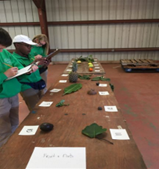
The study also revealed that participation in fairs through 4-H had a significant positive effect on participants’ levels of caring, contribution, and character. These characteristics are also part of the Essential Elements of 4-H that youth experience by being in an active 4-H program throughout the year. Those elements are Belonging, Independence, Generosity, and Mastery.
One of the most important skills that youth learn through participation in youth shows and fairs is responsibility. Whether they are caring for animals, plants, or other projects, youth must take on the responsibility of ensuring that their projects are healthy, well-cared for, and ready to be presented to judges and visitors.
 Communication is another key skill that youth develop through participation in youth shows and fairs. Through active participation youth learn the ability to articulate complex ideas, listen actively, and respond thoughtfully to questions and feedback.
Communication is another key skill that youth develop through participation in youth shows and fairs. Through active participation youth learn the ability to articulate complex ideas, listen actively, and respond thoughtfully to questions and feedback.
In addition to these skills, youth shows, and fairs also emphasize important values such as sportsmanship and fair play. Participants are encouraged to respect their competitors, accept both victories and defeats graciously, and uphold the highest standards of ethical behavior. This helps young people develop important social skills, including the ability to work collaboratively with others and build positive relationships.
Finally, participation in youth shows and fairs can help young people develop resilience and perseverance in the face of challenges and setbacks. These events can be competitive and stressful, but they also offer opportunities for young people to learn from failures, bounce back from disappointments, and remain motivated to achieve their goals.
A few of the Florida 4-H Shows and Fairs are as follows:
-
- State 4-H Dairy Show Okeechobee March
- 4-H Chick Chain Show Chipley April
- Area North Horse Show Green Cove Springs May
- North Florida Fair Tallahassee November
*For additional opportunities to participate in 4-H Shows and fairs please contact your local 4-H office.
In conclusion, participation in youth shows and fairs can offer a unique and valuable learning experience for young people. By developing important skills such as responsibility, communication, planning, and organization, as well as important values such as sportsmanship and fair play, youth can build the foundation for success in all areas of life.
References:
More information on this study can be obtained by visiting the Journal of Extension at www.joe.org and viewing volume 45, number 6.(Arnold, Meinhold, Skubinna, and Asthton)
by Marcus Boston Jr. | Apr 13, 2023
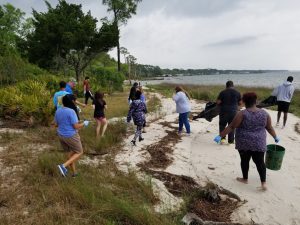 Life skills for youth are defined as a set of abilities and competencies that enable young people to successfully navigate their daily lives and achieve their goals. These skills are essential for personal and professional development and help “prepare youth to be responsible citizens and productive members of the workforce.” Florida 4-H provides many opportunities for young people to obtain life skills through project work, community and afterschool clubs, workshops, and leadership programs.
Life skills for youth are defined as a set of abilities and competencies that enable young people to successfully navigate their daily lives and achieve their goals. These skills are essential for personal and professional development and help “prepare youth to be responsible citizens and productive members of the workforce.” Florida 4-H provides many opportunities for young people to obtain life skills through project work, community and afterschool clubs, workshops, and leadership programs.
As a state-wide organization, Florida 4-H prioritizes the development of communication, higher-order thinking, and appreciation of differences. These three life skills are infused throughout our educational activities and programs because they are essential workforce skills. Below are a few examples of local programs that focus on helping youth develop life skills:
- Communication: 4-H provides opportunities for youth to develop their communication skills through the Florida 4-H Public Speaking Contest, demonstrations, and presentations at County/District and 4-H University. These activities help youth learn how to articulate their ideas clearly and confidently.
- Higher Order Thinking: this includes both decision-making and problem-solving.
- Decision-Making: 4-H offers various programs, such as judging contests at fairs, 4-H event planning committees (district/state council), and club activities that help youth develop their decision-making skills. These activities help youth learn how to make informed decisions and evaluate the outcomes of their choices.
- Problem-Solving: 4-H offers various programs, such as STEM projects and engineering challenges, that help youth develop problem-solving skills. These activities encourage youth to think creatively and find innovative solutions to complex problems.
- Appreciation of Differences– 4-H helps youth learn how to respect and communicate with people who might be different from themselves. Many of our programs offer opportunities for youth to meet new people and explore different cultures. We also help youth learn how to address conflict in a positive way through civil discourse. Older youth can participate in exchange programs with 4-Hers from other states and countries (4-H is in all 50 states and 32 other countries!).
- Teamwork: Through 4-H club projects, counselor training, and community service activities, youth learn how to work collaboratively with others towards a common goal, which helps them develop important teamwork skills.
- Responsibility: 4-H club projects and community service activities encourage youth to take responsibility for their actions and to learn the importance of following through on commitments.
- Leadership Development: 4-H offers various programs, such as officer training, public speaking, county/district councils, and community service projects, that help youth develop their leadership skills.
- Self-Confidence: 4-H programs provide a safe and supportive environment where youth can build their self-confidence through public speaking, leadership roles, and community service activities.
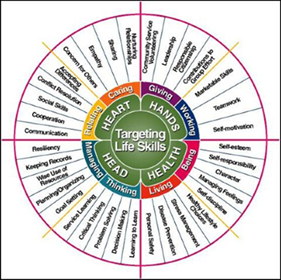
- Service Learning: Through 4-H club work, obtaining a Florida 4-H Community Pride Grant, and active membership on county/district councils, youth members take part in projects and experiences that help them how to become active participants in the communities and apply their experiences to real-life situations.
These are not the only life skills youth in Florida can learn and practice through 4-H- but they are part of almost every program we offer. These are examples of the priority life skills that Florida 4-H promotes among youth, with a focus on cognitive development, interpersonal skills, leadership, civic engagement, and practical skills. Florida 4-H aims to provide a comprehensive youth development program that equips young people with the skills they need to succeed in their personal lives, careers, and communities. Active involvement in 4-H will help members to connect life skills obtained through their 4-H involvement to real-life experiences. For more information on these youth leadership opportunities please contact your local 4-H office.
If you would like to help Florida 4-H teach life skills, or get your child involved in our program, reach out to your local UF/IFAS County Extension Office. There is an office in every county in Florida. Spring is a great time to get involved, because 4-H offers several summer programs for youth to develop life skills!
References:
Marilyn N. Norman and Joy C. Jordan.2018.Targeting Life Skills. EDIS document #4HSFS101.9
Hendricks, P.(1988). Developing Youth Curriculum Using The targeting Life Skills Model
Michigan State Extension. 2016. 4-H Head Life Skill Sheets.(4-H1679)
 Finally, Fall is in the air! It seems like it takes forever for summer to leave Florida. What better way to kick off the Fall season than by bobbing for or picking a deep red, bright green, or yellow apple? Currently, there are over 2,500 varieties of apples grown in the United States, and 7,500 varieties grown throughout the world. Did you know that apples are also grown in all 50 states? That is a lot of apples to celebrate throughout the month of October and on National Apple Day, October 21!
Finally, Fall is in the air! It seems like it takes forever for summer to leave Florida. What better way to kick off the Fall season than by bobbing for or picking a deep red, bright green, or yellow apple? Currently, there are over 2,500 varieties of apples grown in the United States, and 7,500 varieties grown throughout the world. Did you know that apples are also grown in all 50 states? That is a lot of apples to celebrate throughout the month of October and on National Apple Day, October 21!















